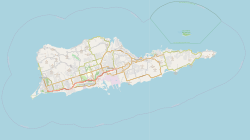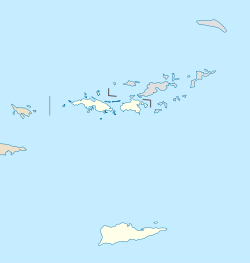
The Virgin Islands National Park is a national park of the United States preserving about 60% of the land area of Saint John, U.S. Virgin Islands, as well as more than 5,500 acres of adjacent ocean, and nearly all of Hassel Island, just off the Charlotte Amalie, Saint Thomas harbor.

Christiansted National Historic Site commemorates urban colonial development of the Virgin Islands. It features 18th- and 19th-century structures in the heart of Christiansted, the capital of the former Danish West Indies on St. Croix Island.

Catherineberg Sugar Mill Ruins is an historic site located in the Virgin Islands National Park, east of Cruz Bay on Saint John, U.S. Virgin Islands. The ruins are an example of an 18th-century sugar and rum factory.

Cinnamon Bay Plantation is an approximately 300-acre (1.2 km2) property situated on the north central coast of Saint John in the United States Virgin Islands adjacent to Cinnamon Bay. The land, part of Virgin Islands National Park, was added to the United States National Register of Historic Places on July 11, 1978. Archaeological excavations of the land document ceremonial activity of the Taínos, as well as historic remains of plantation ruins.

Mary Point Estate is a historic property located on the north coast of Saint John, United States Virgin Islands on Mary's Point. The plantation was added to the U.S. National Register of Historic Places on May 22, 1978.

Reef Bay Sugar Factory Historic District is a historic section of Saint John, United States Virgin Islands located on the south central coast adjacent to Reef Bay. The land is the site of a sugar factory. The property was added to the U.S. National Register of Historic Places on July 23, 1981.
Green Kay is a settlement on the island of Saint Croix in the United States Virgin Islands. It is located 3.3 miles (5.3 km) east of Christiansted.
Grove Place is a settlement on the island of Saint Croix in the United States Virgin Islands. It was added to the National Register of Historic Places in 1978.
Sion Hill is a settlement on the island of Saint Croix, in the United States Virgin Islands.

The Danish West India and Guinea Company Warehouse is a historic building located at Church and Company Streets in Christiansted, U.S. Virgin Islands. Built in 1749 for the Danish West India and Guinea Company, the building served as the center of Danish commerce on Saint Croix during the 18th and early 19th centuries. At the time, the U.S. Virgin Islands were known as the Danish West Indies, and Saint Croix had the most successful economy of the three islands. The building is representative of Danish colonial architecture and features stucco walls made of yellow brick imported from Denmark, an inner courtyard, and several cisterns. After its use as a warehouse ended in the 19th century, the building served as a telegraph office; it became a post office and customs house after the United States purchased the islands in 1917.

The Theron Boyd Homestead is a historic farm property on Hillside Road in Hartford, Vermont. The centerpieces of the 30-acre (12 ha) property are a house and barn, each built in 1786. The house, little altered since its construction, is one of the finest early Federal period houses in the state. The property is owned by the state, which has formulated plans to open it has a historic site. It was listed on the National Register of Historic Places in 1993.

U.S. Virgin Islands Governor's Mansion may refer to any one of the three official residences owned by the government of the U.S. Virgin Islands and provided to the Governor of the United States Virgin Islands. One residence is located on each of the three largest inhabited islands of this U.S. territory in the Caribbean. The U.S. Virgin Islands maintains more official gubernatorial residences than any other state or territory of the United States.

The Christiansted Historic District is a 135.9 acres (0.550 km2) historic district in Christiansted, Saint Croix, Virgin Islands, which was listed on the National Register of Historic Places in 1976. It included 253 contributing buildings and two contributing sites.

Coakley Bay Estate is a 55 acres (22 ha) property in the East End area, east of Christiansted, Saint Croix, U.S. Virgin Islands. It was listed on the National Register of Historic Places in 1976. The listing included seven contributing sites.

https://www.judithsfancy.org/
Estate Hogansborg is located east of Frederiksted off Centerline Road in the Northwest district of Saint Croix, U.S. Virgin Islands, or the West End Quarter of Saint Croix. It dates back to 1757. It was listed on the U.S. National Register of Historic Places in 1978. The listing included four contributing buildings, two contributing structures, and three contributing sites on 4.6 acres (1.9 ha).
The L'Esperance Historic District, located east of Cruz Bay off Center Line Rd., on Saint John in the U.S. Virgin Islands, is a historic district which was listed on the National Register of Historic Places in 1981. It is located within Virgin Islands National Park. The listing included two contributing structures and nine contributing sites on 6.3 acres (2.5 ha).
Slob Historic District, near Christiansted, Virgin Islands, is a historic district which was listed on the National Register of Historic Places in 1987. The listing included nine contributing buildings, three contributing structures, and a contributing site on 9 acres (3.6 ha).
Estate St. John, near Christiansted on Saint Croix in the United States Virgin Islands, was listed on the National Register of Historic Places in 1978. It has also been known as St. Jan Plantage. The listing included two contributing buildings and a contributing structure.
Estate La Reine, near Christiansted on Saint Croix in the U.S. Virgin Islands, dates from around 1750. It was listed on the National Register of Historic Places in 1980. The listing included three contributing buildings, two contributing structures, and a contributing site.
















